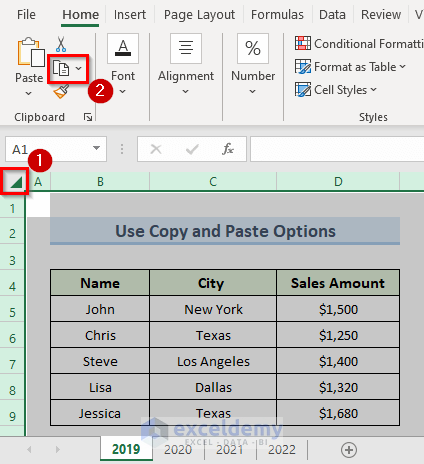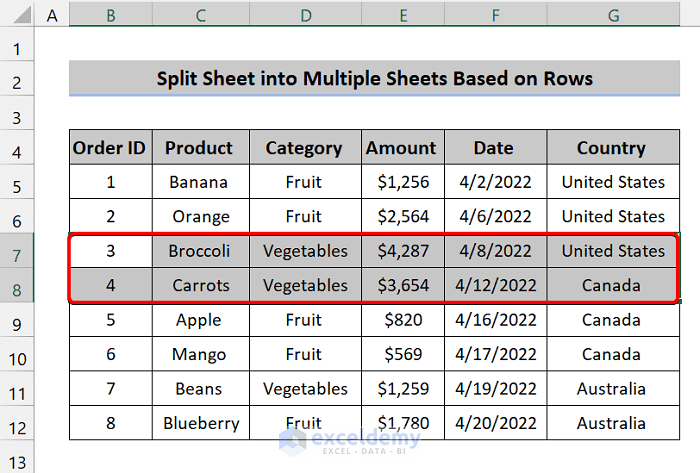Split Excel Sheets Easily: 2 Simple Methods

Are you tired of manually splitting your large Excel files into separate sheets? Whether you're organizing data for a project, sharing specific information with team members, or just need to manage vast amounts of data more effectively, Excel provides several methods to help you do this efficiently. In this detailed guide, we'll walk through two straightforward methods to split your Excel sheets: using Excel's built-in features and VBA scripting.
Why Split Excel Sheets?

Splitting Excel sheets can dramatically increase your productivity and data organization:
- Enhanced Data Management: Smaller files are easier to manage, analyze, and share.
- Performance Improvement: Large datasets can slow down Excel; splitting them helps maintain performance.
- Collaboration: Share specific data without giving out entire datasets, maintaining confidentiality.
- Reduced Complexity: Simplify your workbook by breaking it into more manageable parts.
Method 1: Using Excel’s Built-in Features

Excel’s built-in functionality offers an easy way to split sheets without needing to delve into coding. Here’s how:
Step 1: Data Sorting

Begin by sorting your data according to the criteria you want to use for splitting:
- Go to the Data tab.
- Choose Sort & Filter, then select Sort.
- Sort the data based on a key column like Department or Date.
Step 2: Inserting Filters

Insert filters to help with splitting:
- Select your data range.
- Click Data > Filter.
Step 3: Separating Data into New Sheets

Now, manually move the data into new sheets:
- Use the filter dropdown to select unique values.
- Copy and paste this data into a new sheet, which you can name accordingly.
🚨 Note: This method requires manual effort but is very straightforward if you're new to Excel.
Method 2: Using VBA for Automation

For a more automated approach, VBA scripting can save significant time:
Creating a VBA Macro

Here’s how to set up a VBA macro to split your Excel sheets:
- Press Alt + F11 to open the VBA editor.
- Go to Insert > Module to add a new module.
- Paste the following code into the module:
Sub SplitSheetsByColumn()
Dim ws As Worksheet
Dim LastRow As Long, LastColumn As Long
Dim i As Long, j As Long
Dim wsName As String
Dim dataRange As Range
Dim dict As Object
Set dict = CreateObject("Scripting.Dictionary")
'Assume data starts from A1
Set ws = ThisWorkbook.Sheets(1)
LastRow = ws.Cells(ws.Rows.Count, "A").End(xlUp).Row
LastColumn = ws.Cells(1, ws.Columns.Count).End(xlToLeft).Column
'Get unique values from Column A
For i = 2 To LastRow
wsName = Trim(CStr(ws.Cells(i, 1).Value))
If Not dict.Exists(wsName) Then
dict.Add wsName, i
End If
Next i
'Create new sheets and move data
For Each key In dict.Keys
wsName = key
ws.Copy After:=Sheets(Sheets.Count)
Set wsNew = ActiveSheet
wsNew.Name = wsName
wsNew.Range("A1", wsNew.Cells(LastRow, LastColumn)).Clear
Set dataRange = ws.Range(ws.Cells(1, 1), ws.Cells(LastRow, LastColumn))
dataRange.AutoFilter Field:=1, Criteria1:=wsName
dataRange.SpecialCells(xlCellTypeVisible).Copy wsNew.Range("A1")
dataRange.AutoFilter
On Error Resume Next
Application.DisplayAlerts = False
wsNew.Cells.Delete
Application.DisplayAlerts = True
On Error GoTo 0
Next key
MsgBox "Sheets split successfully!"
End Sub
Running the Macro

After setting up the macro:
- Close the VBA editor.
- Go to Developer tab > Macros > select SplitSheetsByColumn and run it.
| Macro | Description |
|---|---|
| SplitSheetsByColumn | Splits the worksheet by column A into separate sheets. |
| CreateObject("Scripting.Dictionary") | Used to collect unique values from column A. |

📌 Note: Ensure that column A contains the data for splitting. Modify the macro if splitting by a different column is needed.
By following these methods, you can efficiently manage your large Excel files. While the manual method is straightforward and great for smaller datasets or beginners, the VBA macro provides automation for larger or repetitive tasks. Choose the method that best fits your needs, and soon, you'll be splitting Excel sheets like a pro!
Can I split sheets based on multiple criteria?

+
Yes, you can modify the VBA code or manually filter multiple columns before copying data to new sheets.
What if my Excel does not have the Developer tab?

+
You can add it by going to File > Options > Customize Ribbon and check Developer in the list of tabs.
Does splitting affect formulas and formatting?

+
Yes, formulas might need to be adjusted in new sheets as cell references change. Formatting is usually preserved, but verify it manually.



